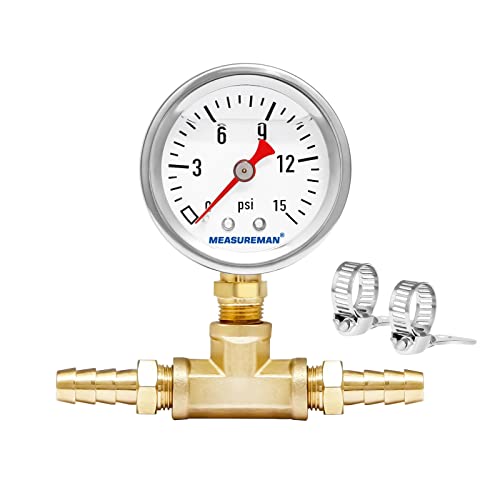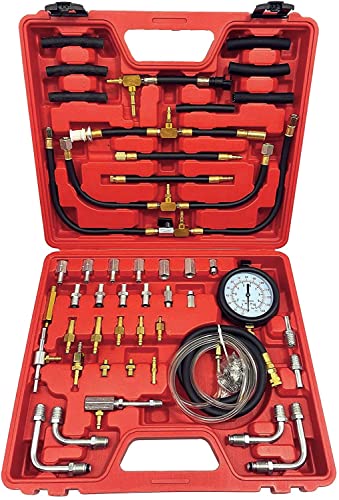It can be incredibly frustrating when your vehicle isn’t running optimally, especially when faced with elusive fuel delivery issues or the simple need to verify your engine’s fuel pressure. I’ve been there, dealing with sputtering engines, rough idling, and the constant worry about whether my fuel system was delivering the correct pressure for peak performance or, worse, for engine longevity. Without an accurate way to monitor fuel pressure, these problems can escalate from minor annoyances to major, costly repairs or even engine damage. Having a reliable tool would have certainly helped me diagnose and prevent such complications.
Before diving into a specific product, it’s crucial to understand why someone would seek out a fuel pressure gauge in the first place and what problems it aims to solve. This category of tools is essential for diagnosing fuel delivery issues, tuning carbureted or fuel-injected engines, ensuring proper fuel pressure for high-performance applications, and even troubleshooting general engine performance problems. If your engine is running lean or rich, struggling to start, or experiencing a loss of power, a fuel pressure gauge is often one of the first diagnostic tools you’ll reach for.
The ideal customer for a fuel pressure gauge kit is undoubtedly the DIY mechanic, automotive enthusiast, or anyone who regularly works on their own vehicles, whether for maintenance, performance upgrades, or troubleshooting. If you’re running an aftermarket carburetor, an EFI system, or simply want to keep tabs on your stock fuel pump’s health, this tool is invaluable. On the other hand, if you rarely open your hood, prefer to leave all vehicle repairs to a professional mechanic, or require a highly specialized industrial-grade monitoring solution, a basic automotive fuel pressure gauge might not be your primary need. For such individuals, a professional diagnostic scan tool or factory service would be more appropriate.
When considering a purchase in this category, there are several key factors to think about. First, the pressure range must match your vehicle’s requirements – a gauge designed for high-pressure EFI systems won’t be suitable for low-pressure carbureted setups, and vice-versa. Material quality is paramount, as the gauge will be dealing with corrosive fuels and varying temperatures; stainless steel and brass are typically preferred. Accuracy is self-explanatory but often overlooked – a gauge that isn’t precise is worse than no gauge at all. Ease of installation is also a big one, especially if you’re frequently attaching and detaching it for diagnostics. Lastly, consider the type of filling (glycerin-filled gauges are excellent for dampening vibrations and pulsation, making readings clearer).
- For meausring fuel pressure, automotive air line pressure or automotive sensor transmission, T-Fitting adapter allows users to install in the fuel line
- Size: 1-1/2" dial size, lower mount, 8mm (5/16") Brass Barbed T-Fitting Adapter, 2 Stainless Steel Clamp with handle
- Pressure Range: 0-15psi single scale
Introducing the MEASUREMAN Fuel Pressure Gauge Kit
The MEASUREMAN Fuel Pressure Gauge Kit 0-15Psi Stainless Steel Glycerin Filled is designed to offer a straightforward and effective solution for monitoring fuel pressure. It’s a compact, 1-1/2″ dial gauge with a 0-15psi single pressure range, specifically suited for lower pressure applications often found in carbureted engines, older fuel injection systems, or as an initial diagnostic tool. What sets this kit apart is its readiness for installation, featuring a convenient 5/16″ (8mm) brass barbed T-Fitting adapter and two stainless steel clamps with handles. The promise of this fuel pressure gauge kit is reliable and steady readings, thanks to its glycerin-filled stainless steel case and brass wetted parts, all designed to withstand the rigors of an automotive environment.
This specific MEASUREMAN gauge is ideally suited for hobbyists, DIY mechanics, and anyone looking for an inexpensive yet functional way to diagnose or monitor low-pressure fuel systems. It’s perfect for setups like a Holley Sniper EFI system or older carbureted vehicles where the pressure requirement falls within its 0-15psi range. It might not be the best fit for modern direct-injection systems or high-pressure fuel pumps that operate at much higher PSI ranges, nor for industrial applications demanding extreme precision or constant, long-term monitoring in harsh environments.
Here’s a quick rundown of its advantages and a couple of points to consider:
Pros:
* Excellent Value: Offers great functionality at a very accessible price point.
* Glycerin-Filled: Helps dampen needle pulsation, providing clearer and more stable readings.
* Easy to Install: Comes with a T-fitting and clamps, making setup straightforward.
* Durable Materials: Stainless steel case and brass wetted parts offer good corrosion resistance.
* Compact Size: The 1-1/2″ dial fits well in tight engine bays and is easy to store.
Cons:
* Clamps Could Be Better: While functional, some users might prefer more robust clamping solutions.
* Glycerin Fill Level: A minor complaint from some users about the glycerin level.
* Limited Pressure Range: 0-15psi is great for specific applications but unsuitable for higher-pressure systems.
* Isolated Malfunction Reports: While rare, there have been very few reports of significant issues, underscoring the importance of careful installation and leak checks.
- UNIVERSAL FUEL PRESSURE TESTER: This pressure tester kit by Orion Motor Tech includes everything you need to quickly and easily check fuel pump pressure on most gasoline vehicles from Chevrolet, Ford,...
- 【Universal Design】:Fuel pressure Tester kit suits a variety of gasoline engines on car, truck, SUV, Motorcycle, ATV, RV, etc (Bosch, CIS Jetronic, Throttle Body System on GM vehicles excluded),...
- 【Fuel Injection Test Gauge Kit】: Fitted with 90mm gauge having two scales (psi and bar), reading from 0~140psi and 0~10bar
Deep Dive into Performance: Key Attributes and Advantages
Having used the MEASUREMAN Fuel Pressure Gauge Kit extensively, I can confidently break down its features and the tangible benefits they provide. Each aspect contributes to its overall utility as a diagnostic and monitoring tool.
Accurate Pressure Measurement (0-15psi Range, Glycerin Filled, Accuracy Spec)
The primary function of any pressure gauge is, of course, to measure pressure accurately, and the MEASUREMAN fuel pressure gauge delivers within its specified range. With a 0-15psi single scale, it’s specifically designed for low-pressure fuel systems, which are common in many classic cars, carbureted setups, or even as an initial diagnostic check for some EFI systems. The accuracy is rated at +/-3-2-3%, which for a gauge in this price bracket and application is perfectly adequate for most automotive diagnostic needs.
The true hero of the measurement capability, however, is the glycerin filling. When you connect a gauge directly to a fuel line, especially near the fuel pump or injectors, you’re bound to experience pulsations and vibrations. A dry gauge needle would bounce erratically, making it nearly impossible to get a steady reading. The glycerin acts as a dampener, effectively smoothing out these pulsations. This allows the needle to settle quickly and remain stable, providing a clear, legible reading. For someone trying to fine-tune a carburetor or ensure consistent fuel delivery to an EFI system, this steady reading is invaluable. Without it, you’d be constantly guessing or averaging, which defeats the purpose of precise measurement. This feature alone significantly elevates the utility of this inexpensive fuel pressure gauge.
Durable Construction (Stainless Steel Case, Brass Wetted Parts)
In the automotive world, components need to be robust. They face constant vibrations, temperature fluctuations, and exposure to corrosive fluids. The MEASUREMAN gauge addresses this by featuring a stainless steel case and brass wetted parts. Stainless steel is known for its excellent corrosion resistance, meaning the exterior of the gauge will stand up to under-hood conditions without quickly deteriorating or rusting. This is critical for longevity and maintaining a clear view of the dial.
The “wetted parts” refer to the internal components of the gauge that come into direct contact with the fuel. By using brass for these parts, MEASUREMAN ensures compatibility with various fuel types (including ethanol-blended fuels) and provides resistance against corrosion and degradation from gasoline. Cheaper gauges might use less robust materials that could fail over time, leading to leaks or inaccurate readings. The combination of stainless steel and brass instills confidence that this fuel pressure gauge kit is built to last for many diagnostic sessions and won’t quickly succumb to the harsh automotive environment. The robustness of these materials also contributes to the gauge’s ability to maintain its accuracy over time, resisting internal wear and tear that could compromise readings.
Integrated T-Fitting Adapter & Easy Installation (5/16″ T-fitting, Clamps)
One of the biggest practical advantages of the MEASUREMAN Fuel Pressure Gauge Kit is its comprehensive installation package. It comes with an 8mm (5/16″) brass barbed T-Fitting adapter and two stainless steel clamps with handles. This isn’t just a convenience; it’s a significant time-saver and makes the gauge truly plug-and-play for many applications.
The T-fitting allows you to insert the gauge directly into an existing 5/16″ fuel line, providing a live, in-line reading. You don’t need to hunt for separate adapters or fittings, which can often be a frustrating part of any automotive project. The brass barbs ensure a secure connection to the fuel hose, and the included clamps, while perhaps not the most heavy-duty on the market, are perfectly functional and feature handles for easy tightening and loosening without tools.
This ease of installation means you can quickly set up the gauge to diagnose a problem, get a reading, and then just as easily remove it. This is particularly beneficial for diagnostic work where you might need to temporarily monitor pressure under various conditions or move the gauge between different vehicles or points in the fuel system. It eliminates the need for specialized tools for installation, making it accessible even for beginners. For example, when troubleshooting my Holley Sniper EFI, being able to quickly tap into the fuel line was crucial for verifying pump pressure and regulator function. The convenience provided by the included hardware significantly streamlines the diagnostic process.
Compact 1-1/2″ Dial Size
The 1-1/2″ dial size of this fuel pressure gauge might seem small, but it’s actually a well-thought-out feature for automotive use. Engine bays are notoriously cramped, and finding space for additional tools or permanent monitoring gauges can be a challenge. The compact size of the MEASUREMAN gauge means it can be tucked away in tight spots, making it versatile for temporary diagnostic setups without interfering with other components.
Despite its smaller size, the dial is surprisingly clear and easy to read. The black markings on a white background provide good contrast, and the stable, glycerin-dampened needle makes precise readings straightforward. This compact footprint also makes the gauge highly portable and easy to store in a toolbox without taking up much space. It’s not cumbersome, which encourages its use for quick checks rather than being left in the toolbox due to bulkiness. For a quick visual check during engine startup or while troubleshooting, the clarity and compact nature of the dial are definite advantages.
Versatile Application (Fuel, Air Line, Sensor Transmission)
While marketed primarily as a fuel pressure gauge, the product description highlights its versatility for measuring “automotive air line pressure or automotive sensor transmission” as well. This expands the utility of the MEASUREMAN Fuel Pressure Gauge Kit beyond just the fuel system, adding value to your toolkit.
For instance, if you have an older vehicle with vacuum lines that need checking or low-pressure air lines, this gauge could potentially serve that purpose, provided the pressure falls within the 0-15psi range. This multi-purpose capability means you’re getting more bang for your buck, as one tool can assist in diagnosing different aspects of your vehicle’s performance. While its primary strength lies in fuel pressure, knowing it can pull double duty for other low-pressure applications is a useful bonus for the general automotive enthusiast.
What Real Users Are Saying: Testimonials from the Road
I’ve scoured various online forums and marketplaces, and the general sentiment regarding the MEASUREMAN Fuel Pressure Gauge Kit is overwhelmingly positive, especially considering its affordable price. Many users praise its functionality, noting that it performs exactly as intended for their specific needs, whether it’s on a high-performance V8 engine or a standard EFI setup. There are numerous accounts of the gauge reading within a small percentage of calibrated professional gauges, highlighting its surprising accuracy for a budget-friendly option. Installation is frequently described as easy, and the overall look is often commended. It has proven to be a valuable diagnostic tool, helping users quickly rule out fuel pump issues and narrow down the source of engine problems.
While the vast majority of feedback is positive, a few minor gripes exist. Some users have mentioned that they wished the glycerin fill was slightly higher from the factory, a minor aesthetic point rather than a functional flaw. Additionally, the included clamps, while functional, might not be as robust as some users would prefer for heavy-duty, repeated use. It’s important to acknowledge that like any manufactured product, there can be very rare instances of defects. While most users experience flawless operation, there have been a handful of severe reports detailing issues like excessive needle bounce, fogging, and in extremely rare cases, leaks. These isolated incidents underscore the importance of careful installation and always checking for leaks immediately after setup, a crucial step for any component dealing with fuel. However, these seem to be extreme outliers compared to the widespread positive experiences.
Final Thoughts: Securing Your Engine’s Future
Dealing with fuel system woes, from nagging performance issues to the stress of a potential breakdown, is a headache no car owner wants. The complications of ignoring these signs can range from decreased fuel efficiency and poor engine performance to, in severe cases, costly damage to vital engine components. Accurately monitoring your fuel pressure is not just about troubleshooting; it’s about preventative maintenance and ensuring your engine receives the precise fuel delivery it needs to run reliably and efficiently.
The MEASUREMAN Fuel Pressure Gauge Kit stands out as an excellent solution to these challenges for several compelling reasons. Firstly, its affordability makes proper fuel system diagnostics accessible to everyone, from the casual DIYer to the more seasoned mechanic. You get a reliable tool without breaking the bank. Secondly, its glycerin-filled design and robust stainless steel/brass construction ensure stable, accurate readings and decent longevity in the harsh automotive environment, a critical feature for effective troubleshooting. Lastly, the included T-fitting and clamps make it incredibly easy to install and remove, saving you time and frustration during diagnostic sessions. If you’re looking for a dependable, cost-effective way to monitor your low-pressure fuel system, this MEASUREMAN gauge is a fantastic choice. Don’t wait for a small problem to become a big one; take control of your vehicle’s health. To check out this valuable tool and take the first step towards a healthier engine, Click here!
Last update on 2025-11-11 / Affiliate links / Images from Amazon Product Advertising API




